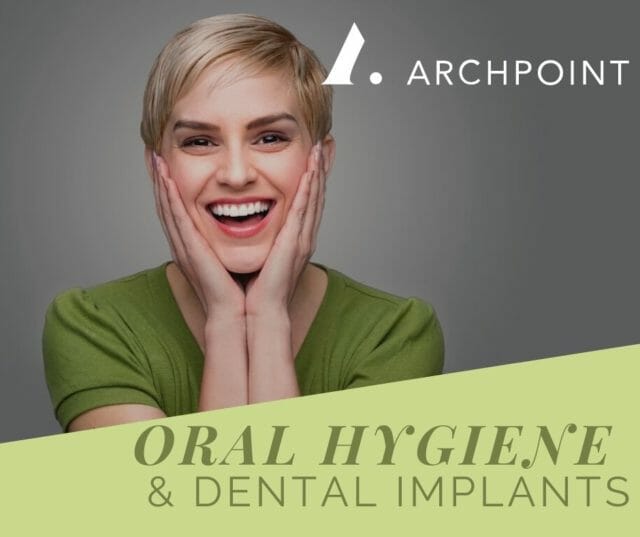Caring for your dental implants is fairly straightforward. But even if you don’t have any remaining “natural” teeth, you should plan to treat your implants as such. Everyday home care and maintenance will keep your breath fresher, smile whiter, and promote healthy tissues that support your implants for the long term.
If you’re planning on getting dental implants in DFW any time soon, here are some basic oral hygiene tips and tricks that you’ll want to know ahead of making the transition.
Brushing Your Dental Implants
Brushing around your dental implants is almost identical to how you brush anatomical teeth. Set aside two minutes twice per day for brushing. You can use a manual brush if you like, but electric toothbrushes tend to be more effective for plaque removal and stain prevention.
Select a non-abrasive toothpaste, especially if any acrylic restorations are involved. Avoid any gritty pastes or baking soda, as it could cause micro-scratching in the surfaces of your dental work and teeth.
Clean along each of the implant restorations paying careful attention especially around the gum tissues. Since plaque tends to be heaviest near the gums, tilting the bristles toward them. The brushing also stimulates your gingiva to promote blood flow and keep tissues healthy.
Do You Have to Floss Dental Implants?
One of the most integral parts in keeping implants intact is cleaning just along the edges of the gums around each implant. This is typically done by flossing since the strand can reach slightly under the gum tissues where a toothbrush does not.
Like flossing teeth, the goal is to curve the strand around the implant in a “C” shape and gently rub up and down.
However, if you’re like a lot of people and you hate to floss — or you just have trouble using it — you can swap it out for a water flosser. Water flossers use heavy streams of water to reach underneath the gums, between implants, and in areas that brushing can’t access. Just note that water flossing can be a bit messy at first and it does take some getting used to.
Unless you’re cleaning around your implant with floss or a water flosser daily, you could predispose yourself to peri-implantitis.
Preventing Gum Disease Around Implants
The implant form of gum disease is referred to as peri-implantitis. Like gingivitis and periodontitis, this infection affects the tissues immediately surrounding your dental implants. It’s also the #1 cause of implant failure.
Fortunately, peri-implantitis is preventable, just like gingivitis and gum disease are. But the key is proper oral hygiene on a day in, day out basis. Unless you’re cleaning all surfaces of your implants thoroughly, the gums around them can become infected from plaque buildup. And in turn, the underlying bone structures may start to shrink back. If gums and bone around implants become diseased, there’s nothing there to support the implant.
Can Implants Erode from Decay-Causing Bacteria?
No. Dental implants cannot get cavities the same way natural teeth do. Nor can the restorations on top of them. But they can still accumulate stain, plaque, and tartar. So even though there isn’t a risk of losing dental implants to tooth decay, you still want to keep them clean every day.
Since implants are often placed alongside natural teeth, you want to be sure that there is no residual buildup or food debris left behind. Otherwise, the implant could potentially harbor bacteria that are detrimental to the adjacent anatomical teeth.
The best advice we can give is to simply treat your implants the same way you would your natural teeth. No, they’re not susceptible to the same types of bacteria, but they still rely on a clean environment for long-term stability and fresh breath.
How to Clean Under Multi-Tooth Implant Restorations
If you have a multi-tooth implant prosthesis such as a bridge, hybrid appliance, or “All-on-4” type of restoration, there’s one extra step you’ll need to take each day. It’s cleaning underneath your appliance.
Depending on the unique restoration and design, this step could be as simple as weaving a floss threader underneath or using tufted “super” floss. The key is to clean back and forth underneath the restoration and then carefully around the inside-surface of your supporting implants. These areas aren’t accessible with an electric toothbrush and you can’t get to them with “traditional” up and down flossing methods.
One other option to clean underneath your multi-tooth implant prosthesis is to toss the floss altogether and use a water flosser instead.
Should I Still Schedule a Dental Cleaning Every 6 Months?
Absolutely. Even if you’re cleaning your implants well, there’s still a risk of small amounts of tartar accumulating in hard-to-reach spaces. Since tartar can harbor the bacteria that causes bone loss and peri-implantitis, you should plan on having a professional cleaning at least twice a year.
Getting your dental implants cleaned requires special equipment that is slightly different than what’s used on natural teeth. Be sure to communicate with your hygienist about your new implants leading up to the appointment, so that they can have the right technology on hand before you arrive.
Other Things to Keep in Mind
Although implants are extremely durable, you still don’t want to put unnecessary stress or pressure on them. If you’re someone who tends to clench and grind your teeth at night, we highly suggest sleeping in a protective nightguard.
Nightguards and similar custom bite splints safeguard your implant restoration to avoid unnecessary chipping or wear to the prosthesis. That way you can extend the long-term success of your investment for years to come.
Ask Our DFW Implant Experts
Archpoint Implant Dentistry is committed to the long-term success of our patients’ smiles. From planning your implant makeover to the everyday maintenance that goes into keeping your smile healthy, we’ll equip you with the resources you need to always put your best face forward.
Enjoy comprehensive, quality implant therapy in DFW. Contact Archpoint Implant Dentistry in Fort Worth to reserve a consultation.








